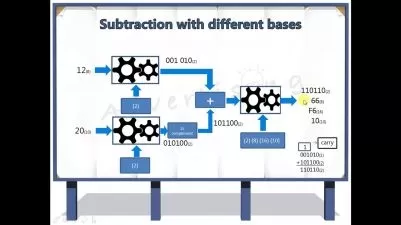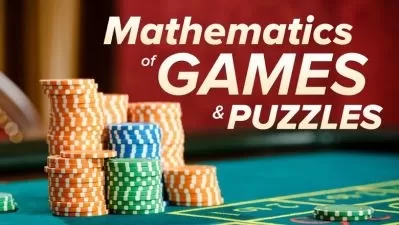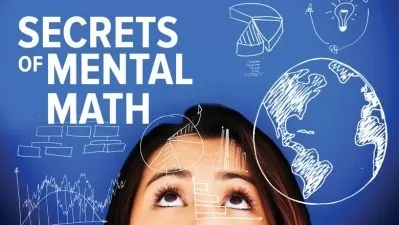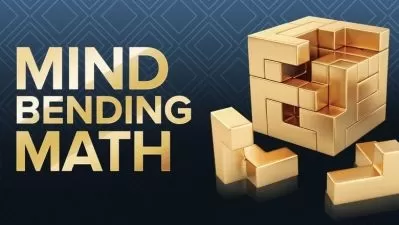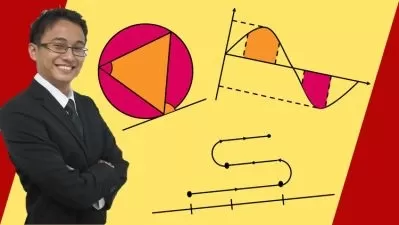Discrete Mathematics
Arthur T. Benjamin
12:46:45
Description
Welcome to Discrete Mathematics, a subject that is off the beaten track that most of us followed in school but that has vital applications in computer science, cryptography, engineering, and problem solving of all types.
Most of the mathematics taught after elementary school is aimed at preparing students for one subject—calculus, which is the mathematics of how things grow and change continuously, like waves in the water or clouds in the sky. Discrete mathematics, on the other hand, deals with quantities that can be broken into neat little pieces, like pixels on a computer screen, the letters or numbers in a password, or directions on how to drive from one place to another.
While continuous mathematics resembles an old-fashioned analog clock, whose second hand sweeps continuously across a dial, discrete mathematics is like a digital watch, whose numbers proceed one second at a time. As a result, discrete mathematics achieves fascinating mathematical results using relatively simple means, such as counting.
Explore this modern realm of digital math in Discrete Mathematics, 24 mind-expanding lectures by veteran Teaching Company Professor Arthur T. Benjamin, an award-winning educator and mathemagician who has designed a course that is mathematically rigorous and yet entertaining and accessible to anyone with a basic knowledge of high school algebra.
Problems, Proofs, and Applications
Discrete mathematics covers a wide range of subjects, and Professor Benjamin delves into three of its most important fields, presenting a generous selection of problems, proofs, and applications in the following areas:
- Combinatorics: How many ways are there to rearrange the letters of Mississippi? What is the probability of being dealt a full house in poker? Central to these and many other problems in combinatorics (the mathematics of counting) is Pascal's triangle, whose numbers contain some amazingly beautiful patterns.
- Number theory: The study of the whole numbers (0, 1, 2, 3, ...) leads to some intriguing puzzles: Can every number be factored into prime numbers in exactly one way? Why do the digits of a multiple of 9 always sum to a multiple of 9? Moreover, how do such questions produce a host of useful applications, such as strategies for keeping a password secret?
- Graph theory: Dealing with more diverse graphs than those that plot data on x and y axes, graph theory focuses on the relationship between objects in the most abstract sense. By simply connecting dots with lines, graph theorists create networks that model everything from how computers store and communicate information to transportation grids to even potential marriage partners.
Learn to Think Mathematically
Professor Benjamin describes discrete mathematics as "relevant and elegant"—qualities that are evident in the practical power and intellectual beauty of the material that you study in this course. No matter what your mathematical background, Discrete Mathematics will enlighten and entertain you, offering an ideal point of entry for thinking mathematically.
In discrete math, proofs are easier and more intuitive than in continuous math, meaning that you can get a real sense of what mathematicians are doing when they prove something, and why proofs are an immensely satisfying and even aesthetic experience.
The applications featured in this course are no less absorbing and include cases such as these:
- Internet security: Financial transactions can take place securely over the Internet, thanks to public key cryptography—a seemingly miraculous technique that relies on the relative ease of generating 1000-digit prime numbers and the near impossibility of factoring a number composed of them. Professor Benjamin walks you through the details and offers a proof for why it works.
- Information retrieval: A type of graph called a tree is ideal for organizing a retrieval structure for lists, such as words in a dictionary. As the number of items increases, the tree technique becomes vastly more efficient than a simple sequential search of the list. Trees also provide a model for understanding how cell phone networks function.
- ISBN error detection: The International Standard Book Number on the back of every book encodes a wealth of information, but the last digit is very special—a "check digit" designed to guard against errors in transcription. Learn how modular arithmetic, also known as clock arithmetic, lies at the heart of this clever system.
Deepen Your Understanding of Mathematics
Professor Benjamin believes that, too often, mathematics is taught as nothing more than a collection of facts or techniques to be mastered without any real understanding. But instead of relying on formulas and the rote manipulation of symbols to solve problems, he explains the logic behind every step of his reasoning, taking you to a deeper level of understanding that he calls "the real joy and mastery of mathematics."
Dr. Benjamin is unusually well qualified to guide you to this more insightful level, having been honored repeatedly by the Mathematical Association of America for his outstanding teaching. And for those who wish to take their studies even further, he has included additional problems, with solutions, in the guidebook that accompanies the course.
With these rich and rewarding lectures, Professor Benjamin equips you with logical thinking skills that will serve you well in your daily life—as well as in any future math courses you may take.
More details
User Reviews
Rating
Arthur T. Benjamin
Instructor's CoursesDr. Arthur T. Benjamin is Professor of Mathematics at Harvey Mudd College. He earned a Ph.D. in Mathematical Sciences from Johns Hopkins University in 1989. Professor Benjamin's teaching has been honored repeatedly by the Mathematical Association of America (MAA). In 2000, he received the MAA Deborah and Franklin Tepper Haimo National Award for Distinguished College or University Teaching of Mathematics. The MAA also named Professor Benjamin the 2006-2008 George Pólya Lecturer. In 2012, Princeton Review profiled him in The Best 300 Professors. He is a professional magician, whose techniques are explained in his book Secrets of Mental Math: The Mathemagician's Guide to Lightning Calculation and Amazing Math Tricks. Professor Benjamin also served for five years as coeditor of Math Horizons magazine. An avid games player, Dr. Benjamin is a past winner of the American Backgammon Tour and has written more than 15 papers on the mathematics of games and puzzles. Professor Benjamin has appeared on dozens of television and radio programs and has been featured in publications, including Scientific American, People, and The New York Times. In 2005, Reader's Digest called him America's Best Math Whiz.

The Great Courses
View courses The Great Courses- language english
- Training sessions 25
- duration 12:46:45
- English subtitles has
- Release Date 2023/06/06






